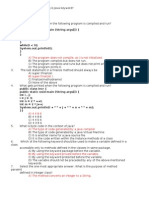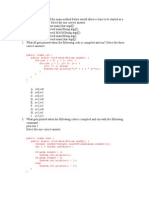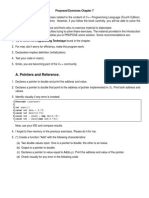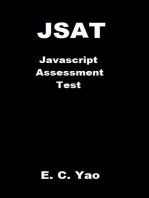0 ratings0% found this document useful (0 votes)
178 viewsJava Practice Test 1
Java Practice Test 1
Uploaded by
Harsha VardhanaThis document contains a practice test for a Java/J2EE programmer with 32 multiple choice questions covering topics such as Java keywords, data types, arrays, exceptions, inheritance, and more. The questions test understanding of Java syntax, semantics, and object-oriented programming concepts.
Copyright:
Attribution Non-Commercial (BY-NC)
Available Formats
Download as DOC, PDF, TXT or read online from Scribd
Java Practice Test 1
Java Practice Test 1
Uploaded by
Harsha Vardhana0 ratings0% found this document useful (0 votes)
178 views6 pagesThis document contains a practice test for a Java/J2EE programmer with 32 multiple choice questions covering topics such as Java keywords, data types, arrays, exceptions, inheritance, and more. The questions test understanding of Java syntax, semantics, and object-oriented programming concepts.
Original Title
Java practice test 1
Copyright
© Attribution Non-Commercial (BY-NC)
Available Formats
DOC, PDF, TXT or read online from Scribd
Share this document
Did you find this document useful?
Is this content inappropriate?
This document contains a practice test for a Java/J2EE programmer with 32 multiple choice questions covering topics such as Java keywords, data types, arrays, exceptions, inheritance, and more. The questions test understanding of Java syntax, semantics, and object-oriented programming concepts.
Copyright:
Attribution Non-Commercial (BY-NC)
Available Formats
Download as DOC, PDF, TXT or read online from Scribd
Download as doc, pdf, or txt
0 ratings0% found this document useful (0 votes)
178 views6 pagesJava Practice Test 1
Java Practice Test 1
Uploaded by
Harsha VardhanaThis document contains a practice test for a Java/J2EE programmer with 32 multiple choice questions covering topics such as Java keywords, data types, arrays, exceptions, inheritance, and more. The questions test understanding of Java syntax, semantics, and object-oriented programming concepts.
Copyright:
Attribution Non-Commercial (BY-NC)
Available Formats
Download as DOC, PDF, TXT or read online from Scribd
Download as doc, pdf, or txt
You are on page 1of 6
Java/J2EE Programmer Practice Test 1 (page 2)
1. Which of the following are valid definitions of an application’s main( ) method?
a) public static void main(); //compile but no main()
b) public static void main( String args ); //same
c) public static void main( String args[] ); //works
d) public static void main( Graphics g );
//not compiled n for this u hav to import java.awt.graphics
e) public static boolean main( String args[] );
// works but must return Boolean value…
2. If MyProg.java were compiled as an application and then run from the command line
as:
java MyProg I like tests
what would be the value of args[ 1 ] inside the main( ) method?
a) MyProg
b) “I”
c) “like” (correct)
d) 3
e) 4
f) null until a value is assigned
3. Which of the following are Java keywords?
a) array //no
b) boolean //yes
c) Integer //false
d) protect //false
e) super //true
4. After the declaration:
char[] c = new char[100];
what is the value of c[50]?
a) 50
b) 49
c) ‘\u0000'
d) ‘\u0020'
e) ” ”
f) cannot be determined
g) always null until a value is assigned //true
DOUBT 5. After the declaration:
int x;
the range of x is:
a) -231 to 231-1
b) -216 to 216 - 1
c) -232 to 232
d) -216 to 216
e) cannot be determined; it depends on the machine
6. Which identifiers are valid?
a) _xpoints
b) r2d2
c) bBb$
d) set-flow //error
e) thisisCrazy
7. Represent the number 6 as a hexadecimal literal. ANS: 06
8. Which of the following statements assigns “Hello Java” to the String variable s?
a) String s = “Hello Java”; //correct
b) String s[] = “Hello Java”; //false //cant convert type
c) new String s = “Hello Java”; //false wrong literal new..
d) String s = new String(”Hello Java”); //correct
9. An integer, x has a binary value (using 1 byte) of 10011100. What is the binary value
of z after these statements:
int y = 1 >> performs signed shift while >>> performs an unsigned shift. //correct
b) >>> performs a signed shift while >> performs an unsigned shift.
c) << performs a signed shift while <<< performs an insigned shift.
d) <<< performs a signed shift while << performs an unsigned shift.
11. The statement …
String s = “Hello” + “Java”;
yields the same value for s as …
String s = “Hello”;
String s2= “Java”;
s.concat( s2 ); //it will not store thts why It displays
Only hello ,if we store in another var then displat all.
True
False //correct…
12. If you compile and execute an application with the following code in its main()
method:
String s = new String( “Computer” );
if( s == “Computer” )
System.out.println( “Equal A” );
if( s.equals( “Computer” ) )
System.out.println( “Equal B” );
a) It will not compile because the String class does not support the = = operator.
b) It will compile and run, but nothing is printed.
c) “Equal A” is the only thing that is printed.
d) “Equal B” is the only thing that is printed. //correct
e) Both “Equal A” and “Equal B” are printed.
13. Consider the two statements:
1. boolean passingScore = false && grade == 70;
2. boolean passingScore = false & grade == 70;
The expression
grade == 70
is evaluated:
a) in both 1 and 2
b) in neither 1 nor 2 //correct (&& not defined for
Boolean and integer)
c) in 1 but not 2
d) in 2 but not 1
e) invalid because false should be FALSE
14. Given the variable declarations below:
byte myByte;
int myInt;
long myLong;
char myChar;
float myFloat;
double myDouble;
Which one of the following assignments would need an explicit cast?
a) myInt = myByte;
b) myInt = myLong; //required
c) myByte = 3;
d) myInt = myChar;
e) myFloat = myDouble; //false
f) myFloat = 3;
g) myDouble = 3.0;
15. Consider this class example:
class MyPoint
{ void myMethod()
{ int x, y;
x = 5; y = 3;
System.out.print( ” ( ” + x + “, ” + y + ” ) ” );
switchCoords( x, y );
System.out.print( ” ( ” + x + “, ” + y + ” ) ” );
}
void switchCoords( int x, int y )
{ int temp;
temp = x;
x = y;
y = temp;
System.out.print( ” ( ” + x + “, ” + y + ” ) ” );
}
}
What is printed to standard output if myMethod() is executed?
a) (5, 3) (5, 3) (5, 3)
b) (5, 3) (3, 5) (3, 5)
c) (5, 3) (3, 5) (5, 3) //correct
16. To declare an array of 31 floating point numbers representing snowfall for each day
of March in Gnome, Alaska, which declarations would be valid?
a) double snow[] = new double[31]; //correct
b) double snow[31] = new array[31];
c) double snow[31] = new array;
d) double[] snow = new double[31]; //correct
String[] s;
// illegal initialization
s = { “abc”, “def”, “hij”);
int[] arr = new int[] {1,2,3}; // legal
17. If arr[] contains only positive integer values, what does this function do?
public int guessWhat( int arr[] )
{ int x= 0;
for( int i = 0; i < arr.length; i++ )
x = x < arr[i] ? arr[i] : x;
return x;
}
a) Returns the index of the highest element in the array
b) Returns true/false if there are any elements that repeat in the array
c) Returns how many even numbers are in the array
d) Returns the highest element in the array //correct
e) Returns the number of question marks in the array
18. Consider the code below:
arr[0] = new int[4];
arr[1] = new int[3];
arr[2] = new int[2];
arr[3] = new int[1];
for( int n = 0; n < 4; n++ )
System.out.println( /* what goes here? */ );
Which statement below, when inserted as the body of the for loop, would print the
number of values in each row?
a) arr[n].length();
b) arr.size;
c) arr.size -1;
d) arr[n][size];
e) arr[n].length; //correct
19. If size = 4, triArray looks like: //doubt
int[][] makeArray( int size)
{ int[][] triArray = new int[size] [];
int val=1;
for( int i = 0; i < triArray.length; i++ )
{ triArray[i] = new int[i+1];
for( int j=0; j 4 )
{ System.out.println( “Test A” );
}
else if( val > 9 )
{ System.out.println( “Test B” );
}
else System.out.println( “Test C” );
Which values of val will result in “Test C” being printed:
a) val 9
e) val = 0 //true
f) no values for val will be satisfactory
28. What exception might a wait() method throw?
// InterruptedException
29. For the code:
m = 0;
while( m++ < 2 )
System.out.println( m );
Which of the following are printed to standard output?
a) 0
b) 1 //print
c) 2 //print
d) 3
e) Nothing and an exception is thrown
30. Consider the code fragment below:
outer: for( int i = 1; i <3; i++ )
{ inner: for( j = 1; j < 3; j++ )
{ if( j==2 )
continue outer;
System.out.println( “i = ” +i “, j = ” + j );
}
}
Which of the following would be printed to standard output?
a) i = 1, j = 1 //correct
b) i = 1, j = 2
c) i = 1, j = 3
d) i = 2, j = 1 //correct
e) i = 2, j = 2
f) i = 2, j = 3
g) i = 3, j = 1
h) i = 3, j = 2
31. Consider the code below:
void myMethod()
{ try
{
fragile();
}
catch( NullPointerException npex )
{
System.out.println( “NullPointerException thrown ” );
}
catch( Exception ex )
{
System.out.println( “Exception thrown ” );
}
finally
{
System.out.println( “Done with exceptions ” );
}
System.out.println( “myMethod is done” );
}
What is printed to standard output if fragile() throws an IllegalArgumentException?
a) “NullPointerException thrown”
b) “Exception thrown”
c) “Done with exceptions”
d) “myMethod is done”
e) Nothing is printed
32. Consider the following code sample:
class Tree{}
class Pine extends Tree{}
class Oak extends Tree{}
public class Forest
{ public static void main( String[] args )
{ Tree tree = new Pine();
if( tree instanceof Pine )
System.out.println( “Pine” );
if( tree instanceof Tree )
System.out.println( “Tree” );
if( tree instanceof Oak )
System.out.println( “Oak” );
else System.out.println( “Oops” );
}
}
Select all choices that will be printed:
a) Pine //print
b) Tree //print
c) Forest
d) Oops //print
e) (nothing printed).
You might also like
- AP Computer Science A Practice Test 2018Document22 pagesAP Computer Science A Practice Test 2018Kelvin W100% (1)
- Core Java Test QuestionsDocument13 pagesCore Java Test QuestionsVinodKatkar100% (1)
- Practice Exam 3Document33 pagesPractice Exam 3technovNo ratings yet
- Quiz Apcspracticemultiplechoicetest2016Document31 pagesQuiz Apcspracticemultiplechoicetest2016api-255636511100% (1)
- Advanced C++ Interview Questions You'll Most Likely Be AskedFrom EverandAdvanced C++ Interview Questions You'll Most Likely Be AskedNo ratings yet
- 64 Java Questions For Any Job InterviewDocument19 pages64 Java Questions For Any Job InterviewAashish SinghNo ratings yet
- Java/J2EE Programmer Practice Test: A) B) C) D) E)Document16 pagesJava/J2EE Programmer Practice Test: A) B) C) D) E)Mayur PhanseNo ratings yet
- Top20 Model PaperDocument17 pagesTop20 Model PaperKrishna Chaitanya SakinamNo ratings yet
- Final Part OneDocument14 pagesFinal Part OneVishavjeetDevganNo ratings yet
- Java MockExam - 8Document23 pagesJava MockExam - 8ThyagarajanNo ratings yet
- Java 3Document8 pagesJava 3larsonbob297No ratings yet
- MCQ'sDocument10 pagesMCQ'ssjprabakarsathyNo ratings yet
- Q Bank Answer CPPDocument12 pagesQ Bank Answer CPPmariammosayed5No ratings yet
- Sample SCJP QuestionsDocument23 pagesSample SCJP QuestionsManuel GalganaNo ratings yet
- Java TestDocument24 pagesJava TestNickNo ratings yet
- CS1020E Midterm 1314S2Document12 pagesCS1020E Midterm 1314S2Wang RunyuNo ratings yet
- FNT Software Solutions Placement PapersDocument8 pagesFNT Software Solutions Placement PapersfntsofttechNo ratings yet
- Java ExerciseDocument7 pagesJava ExerciseShweta VermaNo ratings yet
- Final Exam 2023 Code I-1Document8 pagesFinal Exam 2023 Code I-11bonsaadugnaNo ratings yet
- SC JP Java DumpsDocument13 pagesSC JP Java DumpsAbdul GafurNo ratings yet
- Java Doeacc MCQDocument15 pagesJava Doeacc MCQSatyabrata PraharajNo ratings yet
- Summative QuestionsDocument35 pagesSummative QuestionsTom KnobNo ratings yet
- CPP Q Bank My AnswersDocument8 pagesCPP Q Bank My Answersmariammosayed5No ratings yet
- Coding Question PaperDocument6 pagesCoding Question PaperRohit SharmaNo ratings yet
- MT1011S2 cg1103 AnsDocument12 pagesMT1011S2 cg1103 AnsWang RunyuNo ratings yet
- Java 50 QuestionsDocument14 pagesJava 50 QuestionsMuthumanikandan Hariraman0% (1)
- CsolutinDocument31 pagesCsolutinAnurag GoelNo ratings yet
- Mock Exam 3 AnswersDocument25 pagesMock Exam 3 Answersaina15febNo ratings yet
- Java ReviewewrDocument13 pagesJava ReviewewrJaypee CallagaNo ratings yet
- Oracle: Question & AnswersDocument11 pagesOracle: Question & AnswersRafael BarrosNo ratings yet
- SCJP Certification QuestionsDocument152 pagesSCJP Certification Questionsapi-370402880% (5)
- CDocument28 pagesCmom028No ratings yet
- Mock JavaDocument68 pagesMock JavaamitrkgitNo ratings yet
- Main Exam 6Document29 pagesMain Exam 6api-3730216No ratings yet
- Java MCQ MergedDocument850 pagesJava MCQ Mergedunolo123100% (1)
- 1.124J Foundations of Software Engineering Problem Set 1Document13 pages1.124J Foundations of Software Engineering Problem Set 1Imash LIyanageNo ratings yet
- Pro TCS Technical Paid PaperDocument66 pagesPro TCS Technical Paid Paperp kavya100% (1)
- Apollo Computer Education Ltd. Java Programing Language TestDocument11 pagesApollo Computer Education Ltd. Java Programing Language TestmanigandanNo ratings yet
- JavaScript Quick QuizDocument19 pagesJavaScript Quick QuizsajuNo ratings yet
- Capti 1Document11 pagesCapti 1Karthik RoshanNo ratings yet
- Para Certificacion JavaDocument23 pagesPara Certificacion JavaSamuelNo ratings yet
- Java MasterDocument138 pagesJava MasterSonia GirdeNo ratings yet
- Model Sample Paper 1 SolutionDocument14 pagesModel Sample Paper 1 SolutionAditya ParmarNo ratings yet
- C++ Proposed Exercises (Chapter 7: The C++ Programing Language, Fourth Edition)Document7 pagesC++ Proposed Exercises (Chapter 7: The C++ Programing Language, Fourth Edition)Mauricio BedoyaNo ratings yet
- Assignment Mix 118Document31 pagesAssignment Mix 118George AzizNo ratings yet
- C Language Quiz QuestionsDocument23 pagesC Language Quiz Questionsanon_368120202No ratings yet
- Java QuestionsDocument15 pagesJava Questionsapi-3694132No ratings yet
- Are The Identifier of The Class and The File Valid?Document15 pagesAre The Identifier of The Class and The File Valid?Trung Nguyen VietNo ratings yet
- Tech C, C#,javaDocument471 pagesTech C, C#,javaHema MalaniNo ratings yet
- McqonoopsDocument5 pagesMcqonoopsadi979532No ratings yet
- 2 C++Document10 pages2 C++Akanksha OjhaNo ratings yet
- Function Assignment-2Document9 pagesFunction Assignment-2Siwani sainiNo ratings yet
- Final Exam4Document7 pagesFinal Exam4Mcs Candra PutraNo ratings yet
- Preguntas TipoDocument40 pagesPreguntas TipoBREINER ROISER CORREA ATUCSANo ratings yet
- Java Mock3Document19 pagesJava Mock3rishiimcaNo ratings yet
- Advanced C Concepts and Programming: First EditionFrom EverandAdvanced C Concepts and Programming: First EditionRating: 3 out of 5 stars3/5 (1)
- CORE JAVA Interview Questions You'll Most Likely Be AskedFrom EverandCORE JAVA Interview Questions You'll Most Likely Be AskedRating: 3.5 out of 5 stars3.5/5 (11)
- Cheaper Matrix ClocksDocument22 pagesCheaper Matrix ClocksdouzebisNo ratings yet
- Second Quarter ExaminationDocument2 pagesSecond Quarter ExaminationLovelee Janine OrdonioNo ratings yet
- Khutba e FidakDocument103 pagesKhutba e FidakShian-e-Ali NetworkNo ratings yet
- 2as 1st Term ExamDocument3 pages2as 1st Term Exammaian sajaNo ratings yet
- Internship or Industrial Training RakeshDocument27 pagesInternship or Industrial Training RakeshPriyansh SahuNo ratings yet
- Technical English 4Document127 pagesTechnical English 4Emilia VasilevaNo ratings yet
- History of InterpretingDocument7 pagesHistory of InterpretingLarasNo ratings yet
- APE Rubric With Grade TranslationDocument1 pageAPE Rubric With Grade TranslationryanseangallagherNo ratings yet
- Lesson 5: Public SpeakingDocument6 pagesLesson 5: Public SpeakingNoby Ann Vargas Lobete100% (1)
- Spinner ComboBox DropDown List Android Example CodeDocument6 pagesSpinner ComboBox DropDown List Android Example CodeimsukhNo ratings yet
- Mixed I. Use The Verbs in Brackets in The Correct Future Tenses. Use Will-Future, Going To-Future, Simple Present or Present ProgressiveDocument3 pagesMixed I. Use The Verbs in Brackets in The Correct Future Tenses. Use Will-Future, Going To-Future, Simple Present or Present ProgressiveElena CopaceanuNo ratings yet
- Cnmnb7se ManualDocument38 pagesCnmnb7se Manualeveli1na18497No ratings yet
- Pud 3 Bgu InglesDocument20 pagesPud 3 Bgu InglesIbel OrellanaNo ratings yet
- Lec 3 - Programming LanguageDocument18 pagesLec 3 - Programming LanguageRamineni NischalNo ratings yet
- ACT English Practice Test 2Document7 pagesACT English Practice Test 2yoomichinNo ratings yet
- Task - Assignment (ACV-S02) Week 02Document8 pagesTask - Assignment (ACV-S02) Week 02Miguel Delgado0% (1)
- On The Table - English VocabularyDocument2 pagesOn The Table - English VocabularyMiriam TõnismägiNo ratings yet
- Greetings PracticeDocument5 pagesGreetings PracticeLina Vanessa Garcia OsorioNo ratings yet
- Topic 3 - Raster Data Analysis 1Document11 pagesTopic 3 - Raster Data Analysis 1Cheydaa DahamanhuriNo ratings yet
- RF 7800s TR PDFDocument2 pagesRF 7800s TR PDFEdmond100% (1)
- Framing and Error Detection: CSE 123: Computer Networks Stefan SavageDocument55 pagesFraming and Error Detection: CSE 123: Computer Networks Stefan SavageMona SayedNo ratings yet
- CLASS XI Maths EXEMPLAR SOLUTION Chapter - 1 Sets 2024-25Document37 pagesCLASS XI Maths EXEMPLAR SOLUTION Chapter - 1 Sets 2024-25sangameplay7No ratings yet
- PTK Jurnal Ferdika R.B.RDocument17 pagesPTK Jurnal Ferdika R.B.RUlfi ArianaNo ratings yet
- DAI0500B Cortex m7 On v2m mps2Document27 pagesDAI0500B Cortex m7 On v2m mps2Prasika YogaNo ratings yet
- Lesson Plan 8th Grade 2Document3 pagesLesson Plan 8th Grade 2Elena MarinNo ratings yet
- Passive VoiceDocument3 pagesPassive VoicerachidswimmerNo ratings yet
- Differentiated Lesson PlanningDocument2 pagesDifferentiated Lesson Planningapi-533745272No ratings yet
- Hölder's Inequality - WikipediaDocument10 pagesHölder's Inequality - WikipediaDuc DoNo ratings yet
- Arrays: CognifrontDocument12 pagesArrays: Cognifrontchinmay kNo ratings yet
- The Social and Cultural Implications of Curse Tablets (Defixiones) in Britain and On The ContinentDocument15 pagesThe Social and Cultural Implications of Curse Tablets (Defixiones) in Britain and On The ContinentManuelaNo ratings yet

























































































